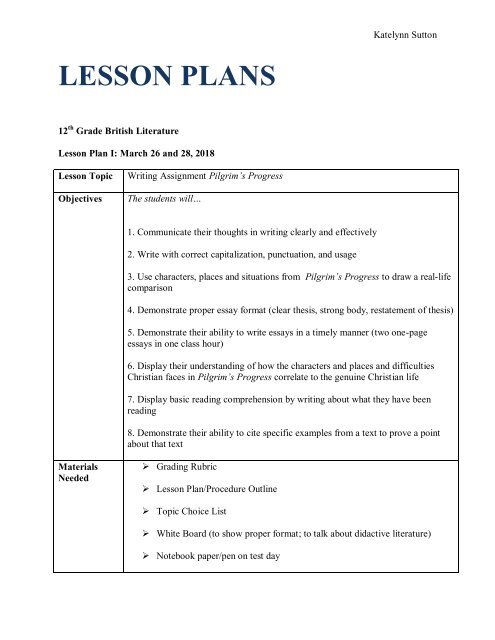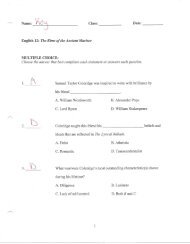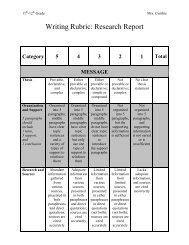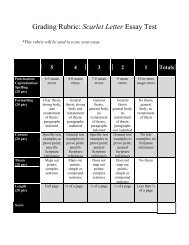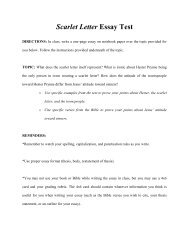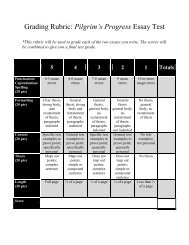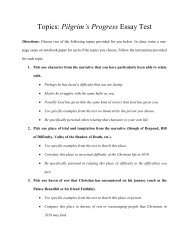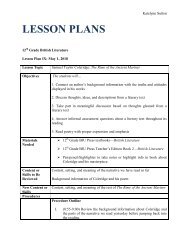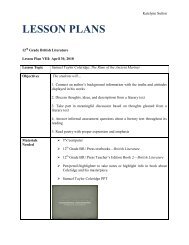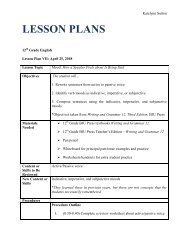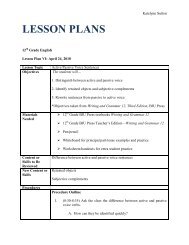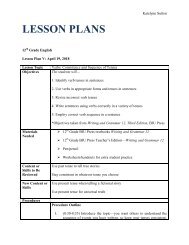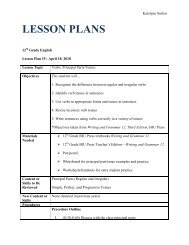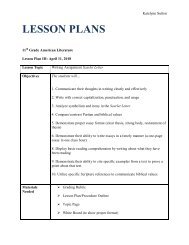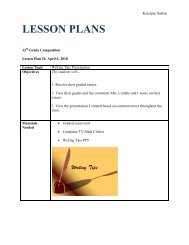17 Pilgrim's Progress Essays - Lesson Plan PDF
You also want an ePaper? Increase the reach of your titles
YUMPU automatically turns print PDFs into web optimized ePapers that Google loves.
Katelynn Sutton<br />
LESSON PLANS<br />
12 th Grade British Literature<br />
<strong>Lesson</strong> <strong>Plan</strong> I: March 26 and 28, 2018<br />
<strong>Lesson</strong> Topic<br />
Objectives<br />
Writing Assignment Pilgrim’s <strong>Progress</strong><br />
The students will…<br />
1. Communicate their thoughts in writing clearly and effectively<br />
2. Write with correct capitalization, punctuation, and usage<br />
3. Use characters, places and situations from Pilgrim’s <strong>Progress</strong> to draw a real-life<br />
comparison<br />
4. Demonstrate proper essay format (clear thesis, strong body, restatement of thesis)<br />
5. Demonstrate their ability to write essays in a timely manner (two one-page<br />
essays in one class hour)<br />
6. Display their understanding of how the characters and places and difficulties<br />
Christian faces in Pilgrim’s <strong>Progress</strong> correlate to the genuine Christian life<br />
7. Display basic reading comprehension by writing about what they have been<br />
reading<br />
8. Demonstrate their ability to cite specific examples from a text to prove a point<br />
about that text<br />
Materials<br />
Needed<br />
‣ Grading Rubric<br />
‣ <strong>Lesson</strong> <strong>Plan</strong>/Procedure Outline<br />
‣ Topic Choice List<br />
‣ White Board (to show proper format; to talk about didactive literature)<br />
‣ Notebook paper/pen on test day
Katelynn Sutton<br />
Content or<br />
Skills to Be<br />
Reviewed<br />
New Content<br />
or Skills<br />
Procedures<br />
Characters, places, and situations that students have encountered so far in Pilgrim’s<br />
<strong>Progress</strong><br />
Writing about those same characters, places and situations; making the book<br />
personal<br />
Procedure Outline<br />
Monday<br />
I. (8:30-8:35) Discuss with the class the difference between didactive and<br />
affective literature – Pilgrim’s <strong>Progress</strong> is meant to teach them something.<br />
A. John Bunyan was a preacher in prison—he was not writing to<br />
entertain<br />
B. It is full of Scripture<br />
C. It depicts the Christian life—defeated and victorious<br />
D. It mentions genuine trials we face and real people with whom we<br />
will come into contact<br />
E. They need to make the book personal to their own lives.<br />
II.<br />
(8:35-8:50) Pass out the essay test topic/instruction sheet. Read through the<br />
topics with them and explain.<br />
A. Be clear about my expectations<br />
B. Correlate the relationship between the didactic Pilgrim’s <strong>Progress</strong> to<br />
this assignment (they will write what they have learned or gleaned)<br />
III.<br />
(8:50-9:05) Pass out and explain the grading rubric.<br />
A. Students will only be graded over what is on the rubric<br />
B. The rubric, although specific, includes things that should already be<br />
true of their writing level as a senior in high school.<br />
C. Remind them of proper essay formatting<br />
D. Be clear about the thesis statement (should be complex; should map<br />
out their points).
Katelynn Sutton<br />
Wednesday<br />
I. (8:30-35) Opening announcements and last minute questions<br />
A. Mrs. Cumbie always opens class with announcements<br />
B. Students will be sure to have questions before they start<br />
II.<br />
(8:35-9:25) Students will have the rest of the period to write their<br />
essays.<br />
A. If the majority of the students do not finish their essays within the<br />
hour, I will “budge” on my time limit and allow them to finish<br />
tomorrow (but I am not going to tell the students that ahead of time;<br />
I want to push them to do their best)<br />
B. Students will not be using their books to write the essays.<br />
C. Students will have two 4x6 cards, containing the information they<br />
deem relevant to use in their writing.<br />
Key Questions<br />
(1) What do we call literature that is meant to teach, not just to please?<br />
(2) What can you apply from the things you have read so far in Pilgrim’s <strong>Progress</strong><br />
to your own Christian life?<br />
Activities<br />
Monday<br />
‣ Class discussion<br />
‣ Assignment explanation<br />
‣ Answering of students’ questions<br />
Wednesday
Katelynn Sutton<br />
‣ Answering of last-minute questions<br />
‣ Writing of essays<br />
Summary or Conclusion<br />
Didactive literature is timeless—the authors of didactive literature use timeless,<br />
universal themes. John Bunyan’s book is especially timeless because his themes<br />
come straight from God’s Word. God’s Word never changes. The salvation<br />
experience, difficulties, negative and positive characters, and influences that John<br />
Bunyan pictures for us are the same for Christians in all ages. I simply want them to<br />
write about what from John Bunyan’s allegory is personal and relative to their own<br />
Christian lives.


